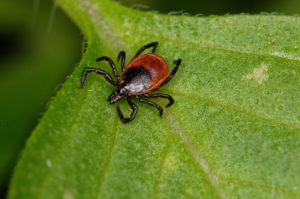
SHARE THIS ARTICLE:
Powassan Virus Cases are on the Rise

Newswise (Tufts University) 10.27.2023, published “Powassan Virus: What to Know about this Rare Tick-Borne Disease.” This article discusses the rising cases of Powassan virus, a tick-borne infection with no vaccine or cure, which kills 1 in 10 people who contract it and causes long-term neurological problems in half of reported cases.
While historically affecting only about one person a year in the U.S., recent cases are increasing, especially in New England and the Great Lakes region. The virus was initially found in deer ticks, notorious for spreading Lyme disease, and researchers at the time believed it didn’t lead to Powassan in humans. It turns out that they were wrong. An elderly woman died from the deer-tick-carried subtype of Powassan virus in 2008. In 2022, 44 cases were reported and as of this year there have been 29 reported cases.
Symptoms include fever, vomiting, and neurological issues. Powassan is different from other tick-borne diseases, as it lives in the tick’s salivary glands, requiring shorter attachment times for transmission. There is no vaccine or specific treatment for Powassan, and diagnosis involves blood or spinal fluid tests. The article emphasizes the rarity of encountering a tick carrying Powassan, but warns parents and dog owners about potential exposure and the importance of preventative measures.
For more information:
Read the full article on the Newswire website here.
Read additional articles on Powassan virus and Lyme on LDA’s website here.
Read additional articles on Deer ticks and Lyme on LDA’s website here.





